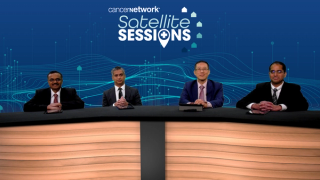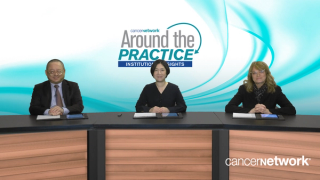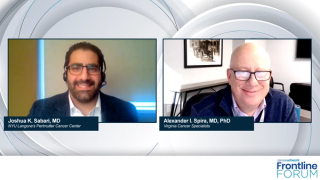
Non-Small Cell Lung Cancer (NSCLC)
Latest News


“Exciting Year” for Targeted Therapy Options for Mutated NSCLC, Experts Say

PD-1 and PD-L1 Inhibitor Combos Show Similar Real-World Efficacy in ES-SCLC
Latest Videos

CME Content
More News
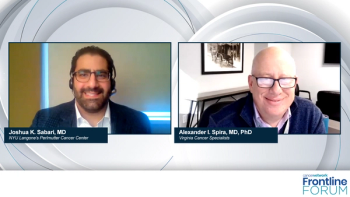
Alexander I. Spira, MD, PhD, and Joshua K. Sabari, MD, discuss ongoing clinical trials focused on NRG1-targeted therapies.

Clinical insights on the diagnosis of NRG1 fusions in patients with non–small cell lung cancer.

Medical oncologists review testing practices for NRG1 fusions for patients with pulmonary or gastrointestinal malignancies.
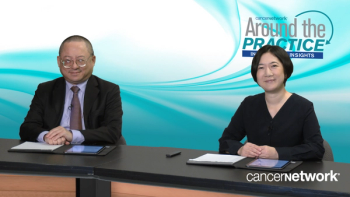
Dr Sai-Hong Ou discusses the future of treatment for non-small cell lung cancer with EGFR exon 20 insertion mutations, highlighting the complexity of these mutations and the need for precision treatments.

Alexander I. Spira, MD, PhD, and Joshua K. Sabari, MD, discuss the prevalence of NRG1 fusions in pulmonary and gastrointestinal solid tumors and provide an overview of treatment practices.
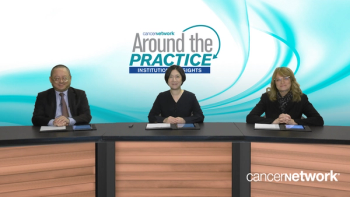
Drs Misako Nagasaka, Sai-Hong Ou, Janellen Smith discuss the management of adverse events, such as infusion reactions and rash, associated with amivantamab treatment for patients with EGFR exon 20 insertion mutations.

Data from the phase 1b/3 IMscin001 trial support the Committee for Medicinal Products for Human Use’s positive opinion on subcutaneous atezolizumab in lung cancer and other disease types.

Sai-Hong Ou, MD, PhD, and Janellen Smith, MD, discuss the management of a patient with non-small cell lung cancer and an EGFR exon 20 insertion mutation who experienced a rash while on treatment with amivantamab; they highlight the importance of continuous treatment and potential considerations for this patient group.
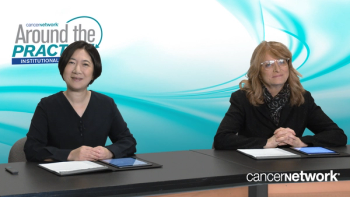
Sai-Hong Ou, MD, PhD, discusses the challenging management of patients EGFR-mutant non-small cell lung cancer who develop resistance to EGFR tyrosine kinase inhibitors, emphasizing the importance of understanding the resistance mechanism to tailor treatment.

The safety profile of durvalumab plus chemoradiation among patients with unresectable non–small cell lung cancer in the phase 3 PACIFIC-2 trial appears to be consistent with prior reports.
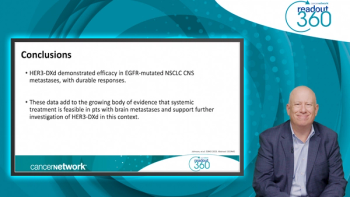
A medical oncologist reviews intracranial efficacy data from HERTHENA-Lung01 on patritumab deruxtecan (HER3-DXd) in patients with previously treated advanced EGFR-mutated NSCLC.

Alexander I. Spira, MD, PhD, FACP, reviews recent data from MARIPOSA-2 looking at amivantamab plus chemotherapy, with or without lazertinib, in EGFR-mutated advanced NSCLC.

Cell therapy and vaccine approaches are among the several potential options for targeting KRAS in patients with KRAS G12C–mutated non–small cell lung cancer, says Sandip P. Patel, MD.
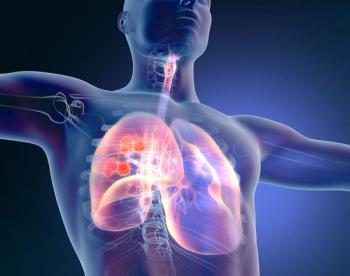
Data from the phase 3 MARIPOSA-2 study support the supplemental biologics license application for amivantamab plus chemotherapy in EGFR-mutated advanced or metastatic non–small cell lung cancer.

Drs Janellen Smith and Misako Nagasaka discuss dermatological adverse events in patients with non-small cell lung cancer associated with EGFR tyrosine kinase inhibitors, offering advice on prevention, treatment, and when to involve a dermatologist.

Dr Sai-Hong Ou and Dr Misako Nagasaka discuss the treatment strategies for EGFR-mutant non-small cell lung cancer, emphasizing the importance of individualized decision making and a multidisciplinary approach.
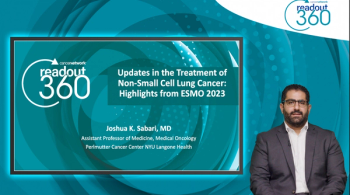
An expert on lung cancer discusses data from TROPION-Lung05 on datopotamab deruxtecan in patients with previously treated NSCLC with actionable genomic alterations.

Joshua K. Sabari, MD, reviews the primary results from the MARIPOSA study presented at ESMO 2023 looking at amivantamab plus lazertinib in EGFR-mutated advanced NSCLC.

Data from the phase 1/2 TRIDENT-1 trial support the FDA approval of repotrectinib for those with ROS1-positive advanced or metastatic non–small cell lung cancer.

Adagrasib, which now has a positive CHMP opinion, was previously examined as part of the phase 1/2 KRYSTAL-1 study.

Next steps for research in lung cancer may include identifying how the gut microbiome impacts responses and adverse effects associated with treatment, says Misako Nagasaka, MD, PhD.

Sai-Hong Ou, MD, PhD, discusses the rapidly evolving landscape of first-line therapy for sensitizing EGFR mutant non-small cell lung cancer, including potential combination therapies and the introduction of new treatment options, such as antibody drug conjugates.

Dr Sai-Hong Ou and Dr Janellen Smith discuss the case of a 59-year-old patient with non-small cell lung cancer and an EGFR mutation who experienced severe diarrhea and acne form rash while on osimertinib, providing insights into managing these treatment-related side effects.

Misako Nagasaka, MD, PhD, and Kristen Neumann, DNP, FNP-C, discussed how to best mitigate adverse effects in patients with non–small cell lung cancer.
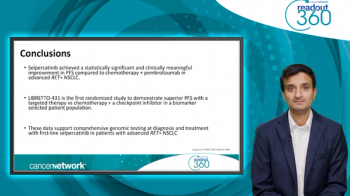
A medical oncologist discusses data from the LIBRETTO-431 clinical trial looking at first-line selpercatinib vs chemotherapy and pembrolizumab in RET fusion–positive NSCLC.




